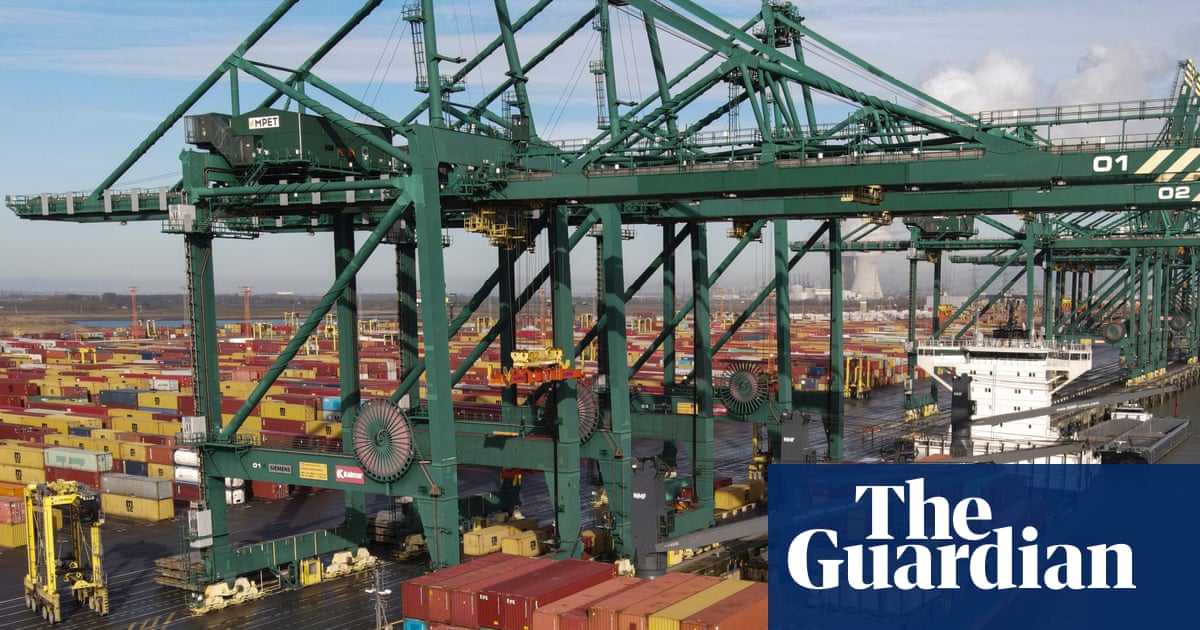Keir Starmer is hosting the firstUK-EU summitsince Brexit on Monday as the government pushes to “reset” the relationship with Britain’s largest trading partner to boost the economy.
Almost a decade on from the EU referendum, and five years since Britain’s formal withdrawal, there are clear economic challenges to tackle, while public disappointment with theBrexitdeal negotiated by Boris Johnson’s Conservatives is rising among remain and leave voters alike.
Here are five charts highlighting the economic context of the summit.
Public support for Brexit has dwindled since the 52%-48% leave vote in the 2016 referendum. Polling by YouGov earlier this year found only30% of Britonsnow think it was right for the UK to vote to leave the EU, versus 55% who say it was wrong. The majority support closer relations with Brussels.
More than six in 10 (62%) reckon Brexit has gone badly, including about a third of leave voters. A majority believe leaving hasdamaged the economy, UK trade and the cost of living.
Isolating the economic impact ofBrexitcan be difficult given other seismic developments, including the Covid-19 pandemic, the war in Ukraine and the fragmentation of global trade. Some economists warned of catastrophe before the 2016 vote, while others predicted a renaissance for “global Britain”. The reality is more nuanced. Still, evidence of economic damage is piling up.
According to theOffice for Budget Responsibility(OBR), the Treasury’s independent forecaster, the UK is expected to suffer a 15% slump in trade and a 4% reduction in national income over the long term.
Brexit involved erecting barriers to trade, which has hit Britain’s goods exports. However, the hurdles could be scaled back through negotiation, and with trade-offs. The EU is the UK’s largest trading partner: in 2024, UK exports to the EU were worth £358bn (41% of all UK exports) and imports £454bn (51% of the total).
Since the end of the EU transition period on 31 December 2020, growth in UK goods exports has fallen significantly behind the rest of the G7. In 2024, goods exports to the EU were18% below their 2019 levelin real terms.
However, services exports – where the UK is a global powerhouse – have outperformed. The OBR estimates this is because the Brexit deal created more friction for goods trade than services, while the UK is also less dependent on the EU for exports of services compared with goods.
Smaller businesses, which find it harder to navigate the post-Brexit red tape, have suffered the most. HMRC estimates the number of customs forms businesses require hasmore than quadrupled, at an extra cost of £7.5bn a year.
After an unexpected result, with no clear plan from the government, and years of bitter infighting over just what Brexit – never properly defined, and often subjective – ought to look like, the political turmoil triggered led businesses to put their investment plans on ice.
Lacking clarity over the UK’s future relationship with the EU, business investment flatlined – compounding an already weak environment for spending on productivity-enhancing kit, infrastructure and buildings, as austerity choked off public investment.
The National Institute of Economic and Social Research (Niesr) estimates business investment was as much as 13% lower in 2023 than under a remain scenario. While it expects this loss to narrow to about 8% by 2035 as businesses adapt, it still corresponds to a gross domestic product (GDP) loss of 5-6% (about £2,300 a person).
Post-Brexit, despite the promises of the leave campaign and the Conservative government, net migration to the UK rose sharply, reaching arecord high of almost 1min the year to June 2023.
Various factors drove the increase, including the war in Ukraine, the effects of the post-Brexit immigration system and pent-up demand for study-related migration after the restrictions of the Covid pandemic.
Almost 90% of arrivals have been from outside the EU, while net migration from the 27-country bloc has fallen. Employers have struggled withstaff shortagesamid the loss of previously readily available EU workers, particularly in construction, hospitality and manufacturing.
Labour pledged in its manifesto to forge closer ties with Brussels but it also committed to a set of red lines to avoid “reopening the divisions” of the 2016 Brexit vote, including promising no return to the EU single market, customs union or freedom of movement. This will limit the scope of the London summit.
James Smith, a research director at the Resolution Foundation, said potential agreements on a defence and security pact, fishing rights, a youth mobility scheme and food standards could bolster the UK economy. However, “the big picture is the red lines rule out the big gains.”
According to estimates by John Springford, an associate fellow at the Centre for European Reform, the demands of the UK and EU suggest the reset could boost Britain’s GDP by a limited amount, of between 0.3% and 0.7%. Far less than the OBR’s estimated 4% long-term reduction in GDP.
However, economists say the reset is important at a time of heightened global uncertainty amid Donald Trump’s global trade war.
“A trade deal with the EU is much more likely to shift the dial than the deals with India and the US,” said Stephen Millard, a deputy director of Niesr.
Much would depend on the details of any deal, he added. “But any movement towards closer integration with our European neighbours is a good thing in that it should raise GDP and, so, help the public finances.”
